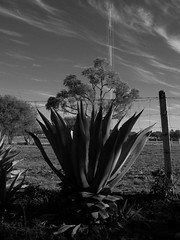Yesterday night, with temperatures of -28 C, which felt like -36C with the wind chill, my bike's lock froze and refused to open. Fortunately, a friend's bottle of Isopropyl alcohol (freezes around -89 C when it's highly concentrated) saved my night. No, I didn't drink it ... we just poured it into the lock's keyhole to ease the frozen pins inside. However, the occasion brought to me the memory of wanting to write some of mine and other's wonderings about alcoholic liquors. So here are these fragments of information... enjoy, and stay warm this season.
A note by Ryan Thomas about the differences between Tequila and Mezcal...
"Few understand the difference between tequila and mezcal, and many don’t even know there is a difference. While traditionally, all tequilas were known as a type of mezcal. Today, they are distinct products, differentiated by the production process and taste, much the same way rye whisky differs from Scotch whiskey. Most mezcal is made today in the state of Oaxaca, although some is also made in Guerrero and other states. Tequila comes from the northwestern state of Jalisco (and a few nearby areas). They both derive from varieties of the Agave plant, known to the natives as mexcalmetl. Tequila is made from only agave tequilana Weber, blue variety. Mezcal, on the other hand, can be made from five different varieties of agave. Tequila is double distilled and a few brands even boast triple distillation. Mezcal is often only distilled once.
"To make mezcal, the sugar-rich heart of the agave called the piña, is baked in a rock-lined pit oven over charcoal, and covered with layers of palm-fiber mats and earth, giving mezcal a strong, smoky flavor. Tequila piñas are baked or steamed in aboveground ovens or autoclaves.
"Tequila and mezcal share a similar amount of alcohol in the bottle (around 38-40%), although mezcals tend to be a little stronger."
Some scattered notes about Whisky (Whiskey) from Wikipedia...
It is always Scotch and Canadian whisky (plural: whiskies), but Irish and American whiskey (whiskeys).
Different grains are used for different varieties, including barley, malted barley, rye, malted rye, wheat, and maize (corn).
Malting is a process applied to cereal grains, in which the grains are made to germinate by soaking in water and are then quickly halted from germinating further by drying/heating with hot air.
Malted grain is used to make beer, whisky, malted shakes, malt vinegar, and some baked goods, such as bagels. Malting grains develops the enzymes that are required to modify the grain's starches into sugars, including monosaccharides (glucose, fructose, etc.) and disaccharides (sucrose, etc.). It also develops other enzymes, such as proteases which break down the proteins in the grain into forms which can be utilized by yeast. Barley is the most commonly malted grain in part because of its high diastatic power or enzyme content.
Yeasts are eukaryotic microorganisms classified in the kingdom Fungi.
Barley (cebada in Spanish) (Hordeum vulgare) is an annual cereal grain, which serves as a major animal feed crop, with smaller amounts used for malting and in health food.
Rye (centeno in Spanish) (Secale cereale) is a grass grown extensively as a grain and forage crop. It is a member of the wheat tribe (Triticeae) and is closely related to barley and wheat. Rye grain is used for flour, rye bread, rye beer, some whiskies, some vodkas, and animal fodder. It can also be eaten whole, either as boiled rye berries, or by being rolled, similar to rolled oats.
Notes aside:
Baker's yeast is the common name for the strains of yeast commonly used as a leavening agent in baking bread and related products, where it converts the fermentable sugars present in the dough into carbon dioxide and ethanol.
Vodka is a distilled beverage. It is a clear liquid which consists of mostly water and ethanol purified by distillation — often multiple distillation — from a fermented substance, such as grain (usually rye or wheat), potatoes or sugar beet molasses, and an insignificant amount of other substances such as flavorings or unintended impurities.
